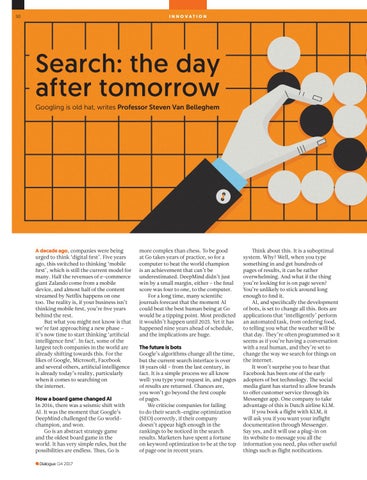innovation
50
Search: the day after tomorrow Googling is old hat, writes Professor Steven Van Belleghem
A decade ago, companies were being urged to think ‘digital first’. Five years ago, this switched to thinking ‘mobile first’, which is still the current model for many. Half the revenues of e-commerce giant Zalando come from a mobile device, and almost half of the content streamed by Netflix happens on one too. The reality is, if your business isn’t thinking mobile first, you’re five years behind the rest. But what you might not know is that we’re fast approaching a new phase – it’s now time to start thinking ‘artificial intelligence first’. In fact, some of the largest tech companies in the world are already shifting towards this. For the likes of Google, Microsoft, Facebook and several others, artificial intelligence is already today’s reality, particularly when it comes to searching on the internet.
How a board game changed AI
In 2016, there was a seismic shift with AI. It was the moment that Google’s DeepMind challenged the Go worldchampion, and won. Go is an abstract strategy game and the oldest board game in the world. It has very simple rules, but the possibilities are endless. Thus, Go is
more complex than chess. To be good at Go takes years of practice, so for a computer to beat the world champion is an achievement that can’t be underestimated. DeepMind didn’t just win by a small margin, either – the final score was four to one, to the computer. For a long time, many scientific journals forecast that the moment AI could beat the best human being at Go would be a tipping point. Most predicted it wouldn’t happen until 2025. Yet it has happened nine years ahead of schedule, and the implications are huge.
The future is bots
Google’s algorithms change all the time, but the current search interface is over 18 years old – from the last century, in fact. It is a simple process we all know well: you type your request in, and pages of results are returned. Chances are, you won’t go beyond the first couple of pages. We criticise companies for failing to do their search-engine optimization (SEO) correctly, if their company doesn’t appear high enough in the rankings to be noticed in the search results. Marketers have spent a fortune on keyword optimization to be at the top of page one in recent years.
Think about this. It is a suboptimal system. Why? Well, when you type something in and get hundreds of pages of results, it can be rather overwhelming. And what if the thing you’re looking for is on page seven? You’re unlikely to stick around long enough to find it. AI, and specifically the development of bots, is set to change all this. Bots are applications that ‘intelligently’ perform an automated task, from ordering food, to telling you what the weather will be that day. They’re often programmed so it seems as if you’re having a conversation with a real human, and they’re set to change the way we search for things on the internet. It won’t surprise you to hear that Facebook has been one of the early adopters of bot technology. The social media giant has started to allow brands to offer customer service through its Messenger app. One company to take advantage of this is Dutch airline KLM. If you book a flight with KLM, it will ask you if you want your inflight documentation through Messenger. Say yes, and it will use a plug-in on its website to message you all the information you need, plus other useful things such as flight notifications.
Dialogue Q4 2017
050-051_Dialogue_Q4_2017.indd 50
21/07/2017 08:12
